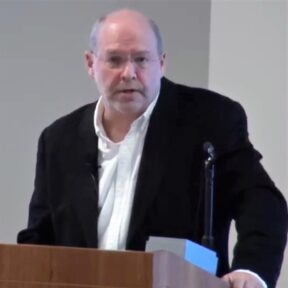
William Arkin
: Photo from Wikimedia Commons / Author of Photo: MFJS DUOverview
* Blogger for the Washington Post.com website
* NBC-TV News military analyst
* News contributor and consultant to MSNBC, MSNBC.com, Defense Daily, and Stars and Stripes Omnimedia
A resident of South Pomfret, Vermont, William M. Arkin is a Senior Fellow at the Philip Merrill Center for Strategic Studies at the Johns Hopkins University in Baltimore. Arkin writes the “Early Warning” blog for the WashingtonPost.com website. He is also an NBC-TV News military analyst, and is a news contributor and consultant to MSNBC, MSNBC.com, Defense Daily, and Stars and Stripes Omnimedia. For the spring 2007 semester, he was the National Security and Human Rights Fellow at the Kennedy School of Government’s Carr Center for Human Rights Policy.
From 1974-78, Arkin served as an intelligence analyst for the U.S. Army in West Berlin. He thereafter co-authored the first volume of the Nuclear Weapons Databook series, an unclassified reference volume on nuclear weapons, for the Natural Resources Defense Council (NRDC). Staunchly opposed to nuclear weaponry, in 1985 Arkin co-authored Nuclear Battlefields, a book revealing the locations of all American and foreign nuclear bases worldwide.
In the late 1980s, Arkin helped establish Greenpeace International‘s “Nuclear Free Seas” campaign, whose task was to find and reveal the locations of naval nuclear weapons all over the globe. In a related effort, he authored or co-authored seven research reports in the Neptune Papers monograph series, which chronicled a list of accidents that had occurred involving naval vessels that were either nuclear-powered or were carrying nuclear weapons. As head of Greenpeace’s war response team in the Persian Gulf during Operation Desert Storm, Arkin co-authored On Impact — Modern Warfare and the Environment: A Case of the Gulf War, a study lamenting the environmental damage caused by the conflict in Iraq.
Since Operation Desert Storm in 1991, Arkin has visited many hundreds of geographic locations that were the targets of military attack in Iraq, Lebanon, Yugoslavia, Afghanistan, and Eritrea — formulating bomb damage assessments in each of those places.
In the late 1990s Arkin developed a nuclear homepage for the Natural Resources Defense Council to complement his April 1997 monograph The Internet and the Bomb: A Research Guide to Policy and Information about Nuclear Weapons.
From 1998 until January 2003, Arkin wrote a bi-monthly column titled Dot.Mil for the WashingtonPost.com. During roughly the same time period, he served as Senior Military Adviser to Human Rights Watch and was a columnist for the Los Angeles Times. In a 2002 L.A. Times piece, Arkin revealed, in a move that enraged General Tommy Franks and Defense Secretary Donald Rumsfeld, secret military information that had been leaked to him — specifically, that “Polo Step” was a Pentagon code for classified material that was more sensitive than “Top Secret.” Rumsfeld ordered an investigation into the leak, though the source was never successfully identified.
From 1985 to 2002, Arkin wrote the “Last Word” column in the Bulletin of the Atomic Scientists, and co-authored the bi-monthly NRDC Nuclear Notebook. He contributed to the yearbook of the Stockholm International Peace Research Institute from 1984 to 2002, and was a contributing editor for Laser Report. In 2006 he served as military advisor to a United Nations fact-finding mission in Israel and Lebanon, where the Israeli Defense Forces were battling Hezbollah terrorists.
Arkin has lectured widely at college campuses, at World Affairs Councils, at military war colleges, and to local organizations in the United States and in thirteen foreign countries. He has authored or co-authored several books, more than 500 articles and conference papers on military affairs, and chapters in more than two dozen edited books.
Arkin penned the 2005 book Code Names: Deciphering U.S. Military Plans, Programs and Operations in the 9/11 World, a 608-page volume revealing some 3,000 U.S. national-security code names, some of which were still classified. His objective was to convince his readers that the U.S. government often designates information as classified not because it is of a sensitive nature, but rather to prevent public debate about its own controversial activities.
On January 30, 2007, Arkin sparked national controversy when he wrote an “Early Warning” blog highly critical of members of the U.S. armed services. In the piece, Arkin reflected upon a recent NBC Nightly News report “in which a number of soldiers expressed frustration with [public] opposition to war in the United States.” “These soldiers,” he said, “should be grateful that the American public … still offer their support to them, and their respect. Through every Abu Ghraib and Haditha, through every rape and murder, the American public has indulged those in uniform, accepting that the incidents were the product of bad apples or even of some administration or command order. … [T]he recent NBC report is just an ugly reminder of the price we pay for a mercenary — oops sorry, volunteer — force that thinks it is doing the dirty work.”
Two days later, Arkin wrote in another blog: “I was dead wrong in using the word mercenary to describe the American soldier today. These men and women are not fighting for money with little regard for the nation. The situation might be much worse than that: Evidently, far too many in uniform believe that they are the one true nation. They hide behind the constitution and the flag and then spew an anti-Democrat, anti-liberal, anti-journalism, anti-dissent, and anti-citizen message that reflects a certain contempt for the American people. … [T]his unanimity of thought and this absolute allegiance to a hierarchy of ideas is and should be foreign in the civilian world.”
For additional information on William Arkin, click here.